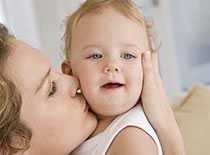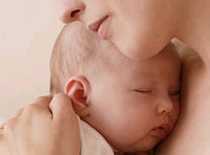Content on this page was developed during the 2009-2010 H1N1 pandemic and has not been updated.
- The H1N1 virus that caused that pandemic is now a regular human flu virus and continues to circulate seasonally worldwide.
- The English language content on this website is being archived for historic and reference purposes only.
- For current, updated information on seasonal flu, including information about H1N1, see the CDC Seasonal Flu website.
2009 H1N1 Flu (Swine Flu) and Feeding your Baby: What Parents Should Know
October 23, 2009 2:00 PM ET
On this Page
This document updates previously posted information for parents about infant feeding and 2009 H1N1 flu (swine flu). It now more clearly addresses parents who are formula feeding as well as breastfeeding, suggests that parents sick with 2009 H1N1 flu (swine flu) find someone who is not sick to feed the baby, and provides more detailed strategies for breastfeeding mothers to maintain breastfeeding throughout the course of infection. This document is based on current knowledge of the 2009 H1N1 flu outbreak in the United States, and may be revised as more information becomes available.
What is this new flu virus?
 This novel H1N1 flu virus (sometimes called “swine flu”) was first detected in people in April 2009 in the United States. This virus is spreading from person-to-person, probably in much the same way that regular seasonal influenza viruses spread.
This novel H1N1 flu virus (sometimes called “swine flu”) was first detected in people in April 2009 in the United States. This virus is spreading from person-to-person, probably in much the same way that regular seasonal influenza viruses spread.
What can I do to protect my baby?
Take everyday precautions such as washing your hands with plain soap and water before feeding your baby. If soap and water are not available, use an alcohol-based hand rub* to clean your hands before feeding your baby. See more tips on good health habits for preventing sickness from the flu virus. In addition, try not to cough or sneeze in the baby’s face while feeding your baby, or any other time you and your baby are close. If possible, only family members who are not sick should care for infants. If you are sick and there is no one else to care for your baby, wear a facemask, if available and tolerable, and cover your mouth and nose with a tissue when coughing or sneezing. For more information, see the Interim Recommendations for Facemask and Respirator Use.
Feeding Your Baby
Is it ok to for me to feed my baby if I am sick?
Infants are thought to be at higher risk for severe illness from 2009 H1N1 infection and very little is known about prevention of 2009 H1N1 flu infection in infants. If you are breastfeeding or giving your baby infant formula, a cautious approach would be to protect your baby from exposure to the flu virus in the following ways:
- Ask for help from someone who is not sick to feed and care for your baby, if possible.
- If there is no one else who can take care of your baby while you are sick, try to wear a face mask at all times when you are feeding or caring for your baby. You should also be very careful about washing your hands and taking everyday precautions to prevent your baby from getting flu. Using a cloth blanket between you and your baby during feedings might also help.
- If you are breastfeeding, someone who is not sick can give your baby your expressed milk. Ideally babies less than about 6 months of age should get their feedings from breast milk. It is OK to take medicines to treat the flu while you are breastfeeding.
Does breastfeeding protect babies from this new flu virus?
There are many ways that breastfeeding and breast milk protect babies’ health. Flu can be very serious in young babies. Babies who are not breast fed get sick from infections like the flu more often and more severely than babies who are breast fed.
Since this is a new virus, we don’t know yet about specific protection against it. Mothers pass on protective antibodies to their baby during breastfeeding. Antibodies are a type of protein made by the immune system in the body. Antibodies help fight off infection.
If you are sick with flu and are breastfeeding, someone who is not sick can give your baby your expressed milk.
Should I stop breastfeeding my baby if I think I have come in contact with the flu?
No. Because mothers make antibodies to fight diseases they come in contact with, their milk is custom-made to fight the diseases their babies are exposed to as well. This is really important in young babies when their immune system is still developing. It is OK to take medicines to prevent the flu while you are breastfeeding. You should make sure you wash your hands often and take everyday precautions. However, if you develop symptoms of the flu such as fever, cough, or sore throat, you should ask someone who is not sick to care for your baby. If you become sick, someone who is not sick can give your baby your expressed milk.
Is it okay to take medicine to treat or prevent 2009 H1N1 flu while breastfeeding?
Yes. Mothers who are breastfeeding and taking medicine to treat flu because they are sick should express their breast milk for bottle feedings, which can be given to your baby by someone who is not sick. Mothers who are breastfeeding and are taking medicines to prevent the flu because they have been exposed to the virus should continue to feed their baby at the breast as long as they do not have symptoms of the flu such as fever, cough, or sore throat.
If my baby is sick, is it okay to breast feed?
 Yes. One of the best things you can do for your sick baby is keep breastfeeding.
Yes. One of the best things you can do for your sick baby is keep breastfeeding.
- Do not stop breastfeeding if your baby is sick. Give your baby many chances to breast feed throughout the illness. Babies who are sick need more fluids than when they are well. The fluid babies get from breast milk is better than anything else, even better than water, juice, or Pedialyte® because it also helps protect your baby’s immune system.
- If your baby is too sick to breast feed, he or she can drink your milk from a cup, bottle, syringe, or eye-dropper.
Get email updates
To receive weekly email updates about this site, enter your email address:
Contact Us:
- Centers for Disease Control and Prevention
1600 Clifton Rd
Atlanta, GA 30333 - 800-CDC-INFO
(800-232-4636)
TTY: (888) 232-6348 - Contact CDC-INFO


